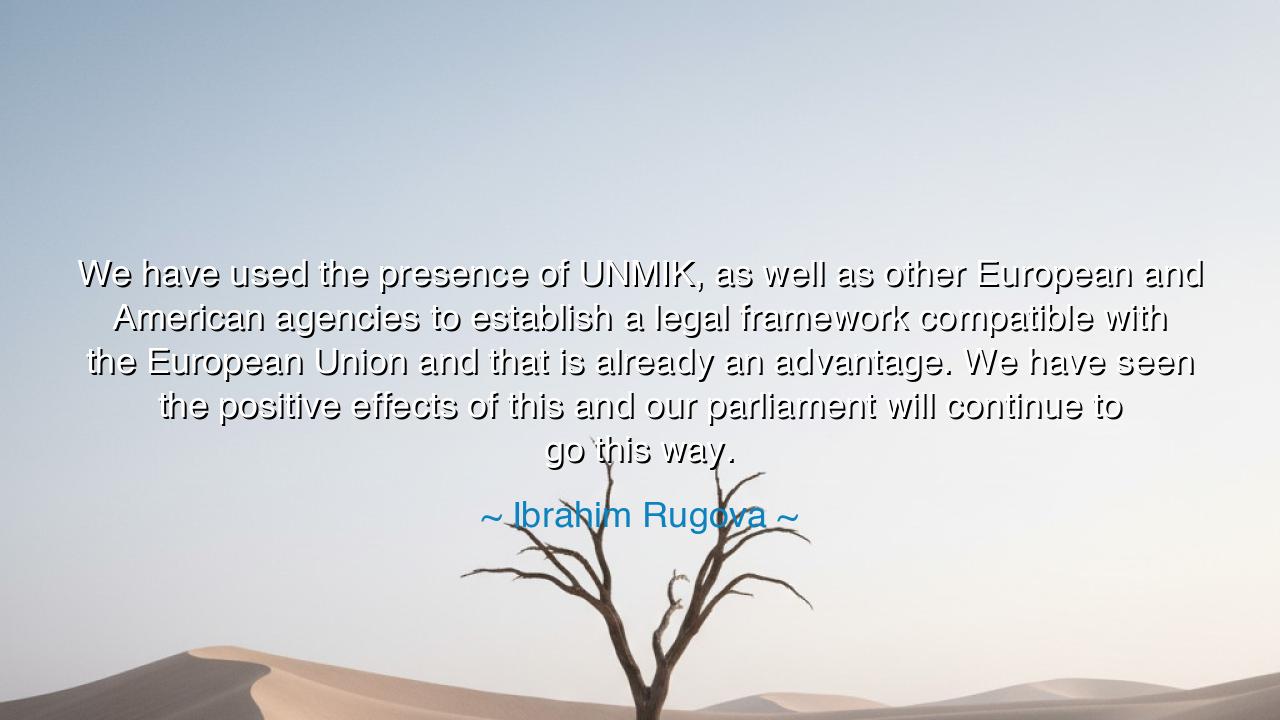
We have used the presence of UNMIK, as well as other European and
We have used the presence of UNMIK, as well as other European and American agencies to establish a legal framework compatible with the European Union and that is already an advantage. We have seen the positive effects of this and our parliament will continue to go this way.






When Ibrahim Rugova proclaimed, “We have used the presence of UNMIK, as well as other European and American agencies to establish a legal framework compatible with the European Union and that is already an advantage. We have seen the positive effects of this and our parliament will continue to go this way,” he spoke not merely as a leader, but as a builder of nations — a man who sought to craft order from chaos, and peace from the ashes of war. His words, though calm and measured, carry the heartbeat of a people rising from the ruins of conflict. They reflect the eternal truth that law, when rooted in justice and guided by wisdom, is the first pillar upon which freedom stands.
To understand the power of this statement, one must see it in its historical context. Rugova spoke as the founding father of a newborn Kosovo — a land long scarred by division, repression, and bloodshed. After the devastation of the Balkan wars, Kosovo came under the administration of UNMIK — the United Nations Mission in Kosovo — which sought to stabilize the region, establish governance, and prevent further descent into violence. Rugova, ever the philosopher and peacemaker, recognized that this international presence was not a symbol of dependence, but an opportunity — a chance to build a legal framework that would anchor Kosovo within the greater family of Europe, aligned with the principles of the European Union: democracy, human rights, and the rule of law.
Rugova’s genius lay in his ability to see law as destiny. Where others saw politics, he saw architecture — the slow and sacred construction of justice. His words reflect the wisdom of the ancients who believed that peace does not come from the sword, but from the structure of just governance. Like Solon of Athens, who reformed his city’s laws to replace tyranny with order, Rugova sought to replace vengeance with vision. He understood that a nation’s survival depends not on its armies, but on its laws — and on the integrity of those who write them.
His use of the term “advantage” reveals a deep understanding of the moral evolution of nations. Rugova saw that aligning with European legal standards was not subservience, but elevation. It was the transformation of Kosovo from a wounded land into a member of a greater human community. For centuries, smaller nations have found strength not in isolation, but in unity — in the weaving of their fate into the larger tapestry of civilization. Like the early states of Greece who formed alliances for peace and trade, Rugova’s Kosovo sought to anchor itself to Europe not through conquest, but through lawful cooperation.
And truly, there were positive effects, as he said. The presence of UNMIK and international agencies helped introduce courts, constitutions, and systems of accountability where once there was only uncertainty. It was as if after a storm, the builders returned to raise the foundations anew — steady, deliberate, unyielding. The parliament’s continuation “to go this way” was not a declaration of blind imitation, but a vow to walk the road of civilization — to move from survival to sovereignty through justice.
But beyond politics, Rugova’s words hold a universal lesson for all people and generations: that progress requires humility. The wise man learns from others, the wise nation accepts help, and both transform that assistance into strength. Rugova reminds us that greatness is not born in isolation, but in the courage to adapt, to listen, and to learn. Just as Rome once absorbed the wisdom of Greece to build its own legal might, so too did Kosovo embrace the structures of Europe to forge its own path toward freedom and peace.
Let this be the teaching that endures: that law is the bridge between chaos and civilization, and that nations rise or fall depending on how faithfully they build upon it. Rugova’s vision was not only for Kosovo, but for all humanity — a reminder that peace built on law is stronger than victory won by war. So, to those who lead and those who follow, let his words guide you: seek harmony through justice, align strength with principle, and never despise the hands that help you rise. For in the unity of nations and the rule of law lies the truest expression of human progress — the slow, noble ascent of mankind from suffering toward wisdom.






AAdministratorAdministrator
Welcome, honored guests. Please leave a comment, we will respond soon